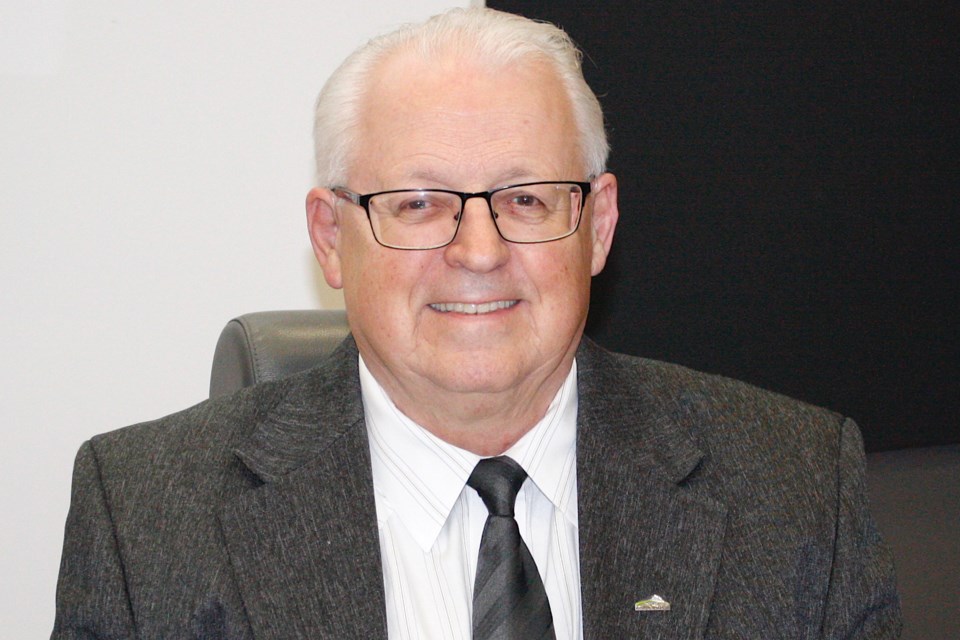SUNDRE — The municipality’s mayor expressed enthusiasm to continue the ball rolling with the newly elected council.
“We’re eager and we’re looking forward to what we can attack for this (coming) year,” said Richard Warnock on Tuesday, Dec. 28.
Asked whether there might be any particular priorities that he looks forward to tackling in 2022, Warnock said some ground work will need to be laid out prior to the upcoming spring workshop.
“The big thing we want to do with our new council, is get our strategic plan — what they want to have on the horizons, and work through that over a day or two and come up with a new mission vision,” Warnock said.
Throughout the 2021 municipal election campaign, the candidates presented their platforms and commitments to the community, and the workshop provides an opportunity to discuss those items in greater depth and agree to priorities, he said.
“So that, we’ll be preparing for over the next couple of months," he said.
Until then, the mayor said he would be working alongside the municipality’s chief administrative officer to set up agendas for upcoming council meetings.
“We did (recently) approve our budget and our capital plan, just for this year though,” he said.
The 2022 budget represents the fourth and final year of the municipality’s first-ever multi-year budget. So now, the purpose with the next budget will be to develop a new, four-year financial planning document that council will be working hard on to get in place for 2023-27, he said.
Council will also be picking up ongoing matters including the provincial government’s revised police funding model.
“There’s still work being done on that,” he said, adding the municipality has not yet received confirmation regarding how much funding the provincial government will be asking for.
“We have our estimate, so we’re hoping that that’s where it stays,” he said. “There will be some information coming from Alberta Municipalities on the police report, and that may help us as we prepare the budget as well.”
With regards to the UCP’s decision to continue investigating the possibility of replacing the RCMP with a provincial police force despite widespread opposition to the plan that is expected would be cost-prohibitive, Warnock feels there is insufficient information to make a decision and that what details are available so far don’t make a compelling case in favour of that approach.
“Of course, rural crime is one of the drivers that’s behind this — I understand that. But I don’t know whether a different name on the door of the police car will help (reduce) rural crime,” he said. “I believe we’re getting a very good service from the RCMP here in our area.”
Barring any late revelations that present a financially persuasive case for a provincial police force, Warnock said he does not favour pursuing that plan.
“My concern as the mayor and as a councillor for Sundre, is if there’s a massive change-over cost, where is that money coming from? If they (the provincial government) download it on the municipalities, we’re going to be in trouble. And there’s no easy way to put it,” he said.
“We would not be doing our jobs if we didn’t look at what they brought forward. But so far, what I’ve seen, heard and what Alberta Municipalities has done, it (provincial police force) doesn’t look like a good thing for small municipalities.”
Additionally, he said council and administration also intend to review the municipality’s recycling approach in light of the provincial government’s plans to introduce an Extended Producer Responsibility (EPR) program.
According to the provincial government’s website, stakeholders have until Jan. 14 to provide further input on the EPR and how the program will be implemented.
The program is billed by the provincial government as an initiative to shift the cost of recycling from municipalities and taxpayers to industries that produce single-use plastics, packaging and paper products.
Alberta Municipalities, formerly the Alberta Urban Municipalities Association, says Alberta is the only province in Western Canada without an EPR on paper and packaging regulations, and in 2019 carried a resolution advocating the provincial government expand the current recycling programs, establish robust EPR regulations for paper and packaging, as well as work with the association to establish a modern recycling framework that sets Alberta on a path toward comprehensive policies.
“There’ll be some information coming forward that our council can work on with our administration to see whether there’s any changes to our (recycling) program,” he said. “We don’t anticipate any. But we want to be, of course, ahead of the curve if some (changes) come along.”
Additionally, the mayors of south central Alberta will also be meeting to work as a group and look at matters that affect partners and municipalities, he said.
“It’s important that we have that all in place. We need to make sure our mutual aid partnerships are in place,” he said.
“There’s so much to work on — there’s a lot on our plate that we can do before the spring workshop.”



